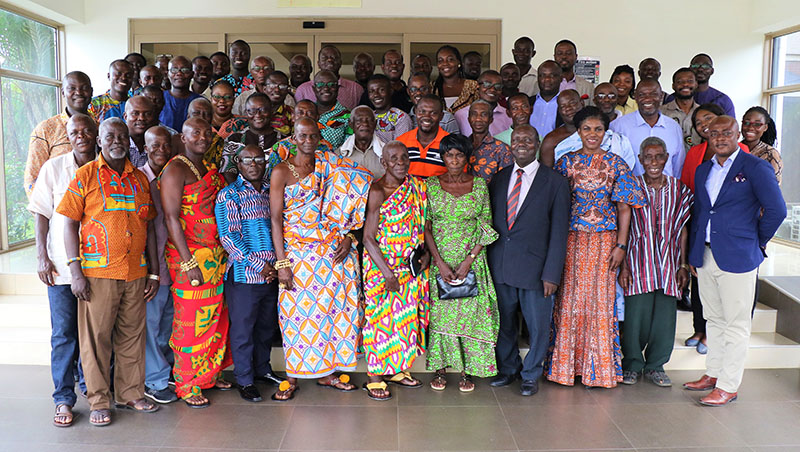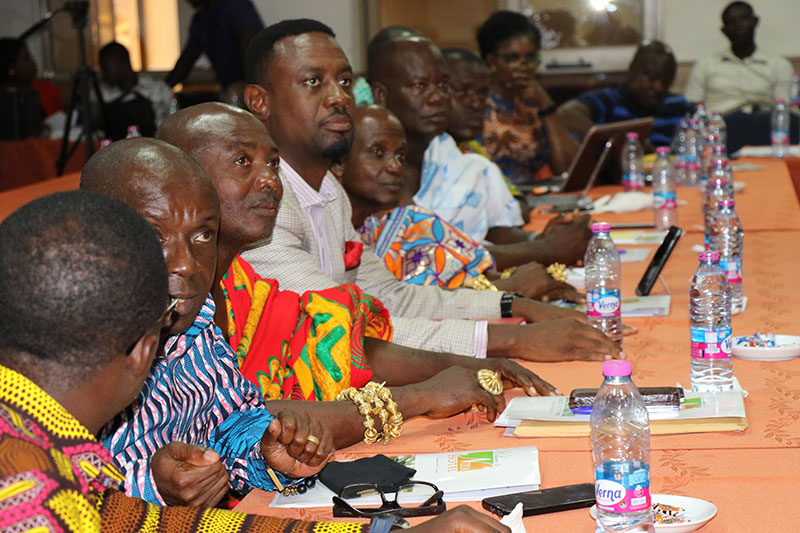 Stakeholders, including the tenant farmers, landowners, civil society, government agencies and the private sector participated in the landmark roundtable.
Stakeholders, including the tenant farmers, landowners, civil society, government agencies and the private sector participated in the landmark roundtable.
Tenant cocoa farmers, the majority of whom are not originally from the Sefwi Wiawso Traditional Area, have long resisted moves by the traditional council to implement a new land-lease agreement without their consent. The dispute has slowed down cocoa rehabilitation and intensification efforts in the area, which covers 614,000 hectares of land and produces about two-thirds of Ghana's cocoa, making an essential contribution to the country’s economy.
Throughout Ghana, land ownership insecurity in cocoa producing areas remains a major obstacle to sustainable cocoa production and the associated implications on livelihoods. Since 2016 Solidaridad West Africa has been working to improve the situation by facilitating stakeholder engagement and capacity building in the Sefwi Wiawso Traditional Area.
The Advocacy for Change project, funded by the Dutch government, aims to improve land governance as an essential and inclusive basis for economic development. It seeks to engage national and local-level cocoa actors to discuss and build consensus on policy and regulatory framework in order. In turn, it works to enhance standards that support the adoption of sustainability interventions in cocoa landscape and bring clarity with regards to:
- on-farm tree ownership
- land tenure
- access
- ownership security
Clarity on these issues enables farmers to invest in long-term sustainable land-use practices, helping to ensure environmental protection and gender mainstreaming.
“It has been difficult to bring the two parties together for a dialogue,” says Eric Agyare, Coordinator for the Advocacy for Change project. “We had to deal with suspicions and the unwillingness of both parties to shift positions and accommodate each other.”
Solidaridad West Africa supported both parties with training on legal and governance perspectives on cocoa land tenure and ownership security, as well as the need for land documentation. This clarity contributed to the parties’ agreement to participate in the renegotiation of the land lease agreement. Tensions have reduced and stakeholders are now willing to engage and shift their position towards finding lasting solution on land documentation and ownership.
 Representatives of the Sefwi Wiawso Traditional Council at the roundtable.
Representatives of the Sefwi Wiawso Traditional Council at the roundtable.
We consider the roundtable meeting a major achievement given the contestations that confronted us. We appreciate the facilitation by Solidaridad West Africa that has resulted in this outcome.
– Nana Agyei, President of the Sefwi Wiawso Settler/Tenant Farmers’ Association
As landowners, we are satisfied with the outcome of the stakeholder engagement so far. The Solidaridad intervention has helped us to move from our entrenched position to one of consensus.
– Nana Kwao Asante Bediatuo, Chairman of the Land Committee of the Sefwi Wiawso Traditional Council
It is expected that the outcome of the stakeholder engagement will provide an adequate foundation for developing appropriate cocoa land tenure and ownership security that will promote a sustainable cocoa industry in Ghana.
This will create an enabling environment to drive major climate change and cocoa sustainability interventions in the Sefwi Wiawso Traditional Area. There will also be the possibility to scale up by introducing the programme in other cocoa farming areas. The intervention complements current national efforts to incentivize landowners and cocoa farmers in the Western North region to rehabilitate cocoa farms.
Learn more about Solidaridad's cocoa programmes
